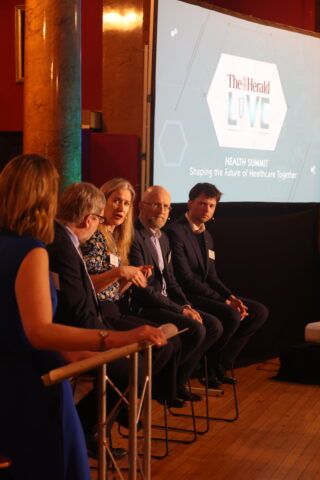What is preventing Scotland’s health and care workforce from delivering the care they want for their patients? Why are we still lagging behind pre-pandemic levels of activity?
And how should we fix the recruitment and retention crises plaguing our NHS and care sector?
These were just some of the questions being discussed as the Herald held its inaugural Health Summit, sponsored by the Royal College of Physicians of Edinburgh (RCPE).
The expert panel brought together insight from general practice, social care, and hospital medicine as Dr Donald Macaskill, CEO of Scottish Care, was joined by Professor Lindsey Pope – a Deep End GP and professor of medical education at the University of Glasgow; Dr Hugh Pearson, a junior doctor and deputy chair of BMA’s Scottish Council; and Dr Conor Maguire, a consultant physician specialising in geriatrics, who is Vice President (International) of the RCPE.
There was also wide-ranging input from the audience with Q&A sessions covering a range of topics, including whether a “rural weighting” in salaries could be used to attract and retain staff in under-doctored regions such as the Highlands and the need to address “unwarranted variation” in services and specialist numbers between health board areas.
Productivity was highlighted, with figures showing that elective activity, emergency admissions, and outpatient appointments remain lower now than before the pandemic, despite a 13% increase in the whole-time equivalent NHS Scotland workforce and a 10% uplift in health spending per head compared to 2019.
The event heard examples of access to operating theatres becoming so stretched that consultants who used to be getting into surgery on a daily basis were sometimes now only getting weekly sessions.
There was a sense that infrastructure such as equipment and theatre spaces had “not kept pace with the increase in staffing”, and that there had been an expectation that fewer beds would be needed.
Dr Maguire noted that more than half of the beds in his elderly medicine ward are occupied by patients well enough to be discharged, but prevented from doing so while they wait for care home places, social care packages, and guardianship orders.
Social care must be more than a “handmaiden” to ease NHS bed blocking, said Dr Macaskill, but he acknowledged that the lack of a “whole system approach” is leading to financial inefficiency.
Patients spending a week in acute hospitals cost the NHS £2,900 a week on average, said Dr Macaskill, compared to £1,500 in a care home or £1000 for home care provision.
However, Dr Macaskill also stressed that measuring the success of health and care should be based on the quality of outcomes for patients as much as by “factory-style” productivity statistics.
Reliance on overseas staff was also highlighted.
While NHS Scotland is comparatively less dependent on international medical graduates compared to the UK average – 19% of NHS Scotland’s medics qualified overseas, excluding EU countries, compared to 32% for the UK as a whole – Prof Pope stressed that the figure is “much higher” in general practice, where the size of the workforce has been shrinking in real terms over the past decade.
It came as research from Scottish Care found that 95-100% of the care workers currently employed by some providers in Scotland have come from overseas.
This had “increased massively”, said Dr Macaskill, to compensate for a loss of EU staff following Brexit and during the Covid pandemic. In some cases, providers had lost around 90% of their EU national employees, he added.
The role of the private sector was also discussed, with figures showing that 9000 consultants are currently working in independent hospitals across the UK. Most are also employed in the NHS.
One option raised during the event was whether the private sector should pay something back to the NHS in recognition that it benefits from the years the health service has invested in training doctors.
Dr Macaskill added that perhaps the NHS should also be required to pay a similar “finder’s fee” to care providers when it recruits their trained care staff into the health service.
Proposals to expand the physician associate workforce also need “more clarity”, said Dr Pearson, amid concerns that there are not enough senior clinicians to supervise them and that training for junior doctors could be jeopardised.
There was also a consensus among panel members that a “national conversation” on the future of the NHS is needed, making clear that a choice has to be made between increased investment or doing less.
Nina Holmes, head of events for Newsquest Events Scotland, said: “Herald Live events are key to bringing individuals across a sector or issue together to discuss and broaden conversations regarding change.
“Only when we bring individuals together to discuss a common cause can the possibility of real change be made.
“Our Q&A sessions allow for answers to be sought from peers, or taken away by our panel of experts for further thought.
“It is increasingly important in these digital times to carve out space to attend industry events that put creating connections at the heart of their ethos.”
For more information on upcoming The Herald Live events please visit https://newsquestscotlandevents.com/

